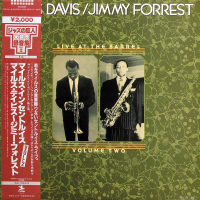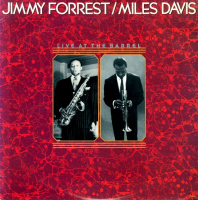Home » Jazz Musicians » Jimmy Forrest
Jimmy Forrest
Born and raised in St. Louis, Forrest worked in the Midwest with pianist Eddie Johnson, Fate Marable, the Jeter-Pillars Orchestra, and Don Albert. Respected for his tone and his swinging style, Forrest worked with the Jay McShann Orchestra and the Andy Kirk big band (1942-1948). He had a stint with Duke Ellington in 1949 and two years later recorded “Night Train.” The success of that hit allowed Forrest to lead his own band for several years, recording other similar r&b-oriented material.
Forrest’s heart was always in swinging jazz and he enjoyed his association with trumpeter Harry “Sweets” Edison during 1958-1963. During that period, Forrest recorded five albums for Prestige and New Jazz, showing that he could play hard bop and soul-jazz in addition to swing and 1950s r&b. “Forrest Fire,” “Out of the Forrest,” “Sit Down and Relax,” “Most Much!,” and “Soul Street,” feature the saxophonist in a quartet with organist Larry Young, groups with either Joe Zawinul or Hugh Lawson on piano, a Latin-flavored date with Ray Barretto, and with the Oliver Nelson Orchestra.
After a period of freelancing, Jimmy Forrest was a major soloist with Count Basie’s orchestra during 1972-1977, spending the years before his death in 1980 co-leading a group with trombonist Al Grey. His brand of stomping and soulful jazz has never gone out of style. Source: James Nadal
Tags
Jimmy Forrest: Black Forrest

by Jack Bowers
Tenor saxophonist Jimmy Forrest, best known and perhaps best remembered as composer of the huge R&B smash, “Night Train,” was also an underrated swing–based player out of the Gene Ammons/Lockjaw Davis/Sonny Stitt school whose ample talents are showcased on the quintet date Black Forrest, recorded in 1959 with the same cast (and a couple of the same songs) that appeared on an earlier Delmark release, All the Gin Is Gone (Delmark 404). As it turns out, the tunes that comprise ...
Continue ReadingBackgrounder: Jimmy Forrest - Out of the Forrest

Source:
JazzWax by Marc Myers
Tenor saxophonist Jimmy Forrest began his recording career in 1943 with Andy Kirk's band. There, he learned all he needed to know about swing. By 1949, he was touring and recording with Duke Ellington. Next came his first leadership album, Night Train, in 1951, featuring the hit title song. Night Train, a lift from Ellington's Happy Go Lucky Local (1946), which was featured in Ellington's The Deep South Suite. But in all fairness to Forrest, he took an Ellington riff ...
read more
Backgrounder: Jimmy Forrest's 'Forrest Fire'

Source:
JazzWax by Marc Myers
In the years leading up to World War II, tenor saxophonist Jimmy Forrest got his start in bands led by Jay McShann and Andy Kirk. After the war, he was with Duke Ellington and then was on his own. His big claim to fame was co-writing and first recording Night Train, which became a jazz and R&B standard. He also toured with Count Basie. Among my favorite albums by Forrest are those on the New Jazz and Prestige record labels. ...
read more
Jimmy Forrest and Night Train

Source:
JazzWax by Marc Myers
Yesterday I posted 10 audio clips by tenor saxophonist Jimmy Forrest. Among them was Night Train, a blues Forrest recorded in 1951 that became a big jukebox hit in '52 and beyond as others covered the song. After my post went up, I heard from Bill Kirchner, who educated me on the song's origins and drama. Bill noted that Forrest's famous Night Train actually dates back to Happy Go Lucky Local by Duke Ellington in 1946 from The Deep South ...
read more
10 Tracks by Jimmy Forrest

Source:
JazzWax by Marc Myers
Jimmy Forrest remains one of the most exquisite and assertive swing tenor saxophonists of the post-war years. His driving solos and sense of time were always fluid and seamless, and he had an extraordinary grasp of how to maximize the impact of a song, especially a blues. Born in 1920 (the same year as Charlie Parker), Forrest grew up in St. Louis, Mo., and began playing with Jay McShann and Andy Kirk before World War II. He spent the late ...
read more
StLJN Saturday Video Showcase: Riding the "Night Train" with Jimmy Forrest

Source:
St. Louis Jazz Notes by Dean Minderman
What's the most performed song ever written by a jny: St. Louis jazz musician? While it's probably impossible to ever know with absolute certainty, at first one might guess that it's something from Miles Davis' Kind of Blue. After all, it is the best-selling jazz album of all time, and tunes from it such as “All Blues" and “So What" frequently get played at jam sessions and on cover gigs, and have been recorded by various other musicians besides Davis. ...
read more
Jimmy Forrest: Sit Down and Relax

Source:
JazzWax by Marc Myers
On the Prestige Records' thermometer, tenor saxophonist Jimmy Forrest sat roughly halfway between Gene Ammons and Sonny Stitt. Forrest had Ammons' bulldog gospel attack but he also had Stitt's glossy slipperiness. Forrest, of course, had his own distinct swinging style that sounded like the blues mounted on a roller skates. He could be both intimate and bossy—improvising long, serpentine lines and resolving them neatly. Forrest could add a fresh quality to virtually any song, even the most frayed standard. In ...
read more
Notes from the Net: A Miles Davis Mega-Set; Jimmy Forrest Remembered; Plus News, Reviews, Interviews, and More

Source:
St. Louis Jazz Notes by Dean Minderman
Here's the latest compilation of assorted news briefs and links related to jazz, improvisation, and creative music in St. Louis, including news of musicians originally from the Gateway City, recent visitors, and coming attractions, plus assorted other items of interest.What with the time demands of the recent site re-design, keeping up with breaking news, and doing some actual paying work in there somewhere, it's been nearly three weeks since our last installment of NftN, and in that time ...
read more
"Jimmy Forrest, Basie and Me"

Source:
JazzWax by Marc Myers
Los Angeles composer and arranger Roy Phillippe and I have been exchanging e-mails on a range of topics. Recently we were on a Neal Hefti tear, particularly Hefti's movie soundtracks. Following my recent post on tenor saxophonist Jimmy Forrest [pictured in the 1950s with trumpeter Harry “Sweets" Edison], Roy passed along this story:
“In 1976, Harry 'Sweets' Edison had a regular Sunday night gig at The Baked Potato, a jazz club owned by pianist Don Randi in North Hollywood, CA. ...
read more
Jack McDuff and Jimmy Forrest

Source:
JazzWax by Marc Myers
I love organ combos, especially when a take-charge tenor sax is in the mix. Groovy pairings that come to mind include Stanley Turrentine and Shirley Scott, Sonny Stitt and Don Patterson, and Charles Earland and Grover Washington Jr. One of the very best “stops 'n' reed" albums is organist Jack McDuff's The Honeydripper with Jimmy Forrest on tenor sax. Talk about slippery organ playing, big builds, and a swinging, commanding sax. This album has it all--plus guitarist Grant Green. [Photo: ...
read more
































